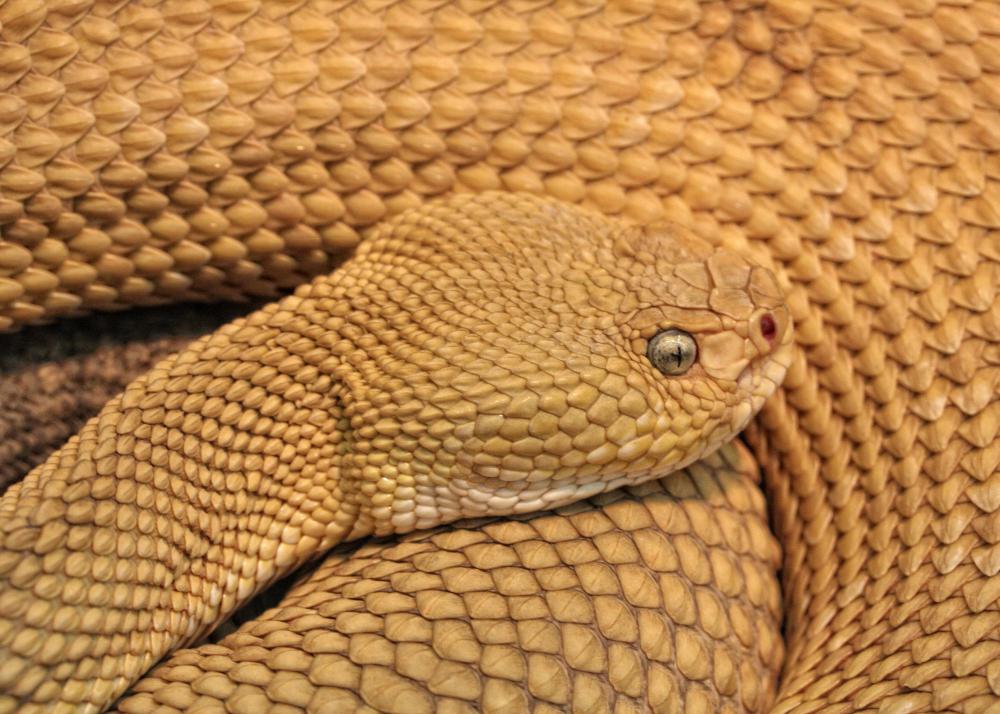At WiseGEEK, we're committed to delivering accurate, trustworthy information. Our expert-authored content is rigorously fact-checked and sourced from credible authorities. Discover how we uphold the highest standards in providing you with reliable knowledge.
What are the Different Types of Snake Bite Treatment?
Snake bite treatment will generally vary depending on the species of the snake in question and whether or not it is considered venomous. The usual approach is to use an antivenin on the patient and cleanse the wound area. If a snake bite treatment has to be performed in the wild, there are many emergency procedures, but some of them are considered ineffective by many scientists. It is usually important that any snake bite treatment be dealt with immediateley, and getting patients to a hospital is considered a high priority.
Antivenin is made by injecting certain farm animals with snake venom. The animals' immune systems react to the venom and produce the appropriate antibodies. These are harvested and used to treat patients bitten by snakes. The influx of antibodies helps give a jump-start to an individual’s immune system, allowing him to more easily deal with the venom's effects.

Many snakebites occur in places where people can’t get access to immediate medical treatment, such as forests during long hikes or campgrounds. There are many recommended treatments in these situations, including lancing the area of the wound and sucking out the venom. Many companies also offer snakebite kits with various tools for performing first aid on snake bites. In scientific testing, most of these methods have generally proven less effective than many would expect, and some experts now recommend a simpler treatment approach. This might include washing the would area, applying a relatively loose tourniquet, and keeping the limb elevated to heart level if possible.

Different kinds of snakes have very different kinds of venom—the two basic types are hemotoxins and neurotoxins. Most snakes have one or the other, but many have venom with at least some portion of both types. Hemotoxins generally cause tissue damage, and they make people bleed internally by damaging blood vessels, while neurotoxins have the capacity to shut down the nervous system, potentially leading to paralysis and an eventual malfunction of internal organs. Snakes also have different delivery mechanisms for venom, with some injecting it and others simply chewing and allowing it to mix with a person’s blood.

In some cases, people may be bitten by snakes that aren’t considered venomous. These animals can still have dangerous bites for a variety of reasons. For one thing, their saliva can be full of bacteria that can potentially lead to infections. It’s also generally true that many non-venomous species actually have toxins in their saliva that are very similar to other snakes' venom—in some cases, these toxins can cause poisoning symptoms. For these reasons, bites from non-venomous species generally require some kind of snake bite treatment as well, and a visit to the emergency room may be a good idea for most people in this situation.
AS FEATURED ON:
AS FEATURED ON:













Discussion Comments
@mobillian33 - I'm not going to advise people not to get medical attention when they are bitten by a snake, because, as you said, every bite has the potential to be deadly, but I will say that the chances of dying from a non-venomous bite are very, very slim.
There are people who actually go into the swamps and catch snakes that they later sell. Some of the snakes are sold as pets and other are used for medicinal purposes. These people can catch as many as several hundred snakes a night, and the hunters will probably get at least one bite per snake.
At the end of the night, they are sick, but they survive and they don't go to the doctor even though the snakebites are painful and making them sick.
@Laotionne - There are plenty of people who are bitten by snakes and do not go to the hospital to get medical attention. Most of them are only sick for a while and then they recover without any lasting problems.
However, there was a man near my hometown who was bitten by a black racer snake. He killed the snake and once he was certain that it was not poisonous, he didn't give the bite much consideration, other than to wash it and apply alcohol. As it turned out, he was allergic, or he got sick from the bacteria from the snakes mouth. Either way, he ended up staying in the hospital for weeks and was fortunate to survive.
Every snakebite should be treated as if the snake is poisonous because every bite has some potential of being deadly, depending on the circumstances.
I'm glad I read the last section of this article where it talks about how anyone bitten by a snake should visit an emergency room or other medical facility. I thought most snake bites were harmless, and that the only ones that could really harm you were those delivered by venomous snakes.
Post your comments